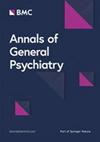埃塞俄比亚流动精神分裂症患者更换抗精神病药物的预测因素:一项基于医院的多中心横断面研究
IF 3.6
3区 医学
Q1 PSYCHIATRY
引用次数: 0
摘要
从一种抗精神病药物换成另一种抗精神病药物是目前治疗中面临的主要挑战。本研究旨在评估埃塞俄比亚西北部精神分裂症患者中抗精神病药物转换的发生率和决定因素。这项多中心医院横断面研究于 2021 年 4 月 30 日至 2021 年 8 月 30 日在埃塞俄比亚西北部的五家综合专科医院进行。研究人员从患者的病历和访谈中提取数据。数据输入 Epi-data 软件 3.5.1 版,并导出到 SPSS 25.0 版进行分析。我们采用多变量逻辑回归模型来确定与药物治疗方案转换相关的因素。研究的显著性水平保持在 P 值为 0.05,置信区间为 95%。研究共涉及 414 名患者,其中 188 名(45.5%)患者在一年内更换了抗精神病药物。无法获得药物是最常见的换药原因。男性[AOR = 2.581,95% CI (1.463,4.552)]、复发[AOR = 2.341,95% CI (1.169,4.687)]、过去一年有住院史[AOR = 3.00,95% CI (1.478,5.715)]和服用典型抗精神病药物[AOR = 3.340,CI (1.76,6.00)]与更换抗精神病药物有显著关联。精神分裂症患者更换抗精神病药物的发生率很高。处方者在给药剂量、选择和转换抗精神病药物时需要谨慎,这有助于减少停药和不必要的转换,从而实现最佳的临床治疗。本文章由计算机程序翻译,如有差异,请以英文原文为准。
Predictors of antipsychotics switching among ambulatory patients with schizophrenia in Ethiopia: a multicenter hospital-based cross-sectional study
A change of therapy from one to another antipsychotic medication is currently the main challenge of therapy. This study aimed to assess the prevalence of antipsychotic medication switches and determinants among patients with schizophrenia in Northwest Ethiopia. Multi-center hospital-based cross-sectional study was conducted at five Comprehensive Specialized Hospitals found in Northwest Ethiopia from April 30, 2021, to August 30, 2021. Data were extracted from both patients’ medical charts and interviews. Data were entered into Epi-data software version 3.5.1 and exported to SPSS version 25.0 for analysis. A multivariable logistic regression model was fitted to identify factors associated with medication regimen switch. The level of significance of the study was kept at a p-value of 0.05 with a 95% confidence interval. A total of 414 patients are involved in the study, and 188 (45.5%) of patients switched antipsychotics within one year. The unavailability of the medication is the commonest reason for switching. Being male [AOR = 2.581, 95% CI (1.463, 4.552)], having relapse [AOR = 2.341,95% CI (1.169,4.687)], history of hospitalization in the past year [AOR = 3.00,95% CI (1.478,5.715)] and taking typical antipsychotics [AOR = 3.340, CI (1.76, 6.00)] had a significant association with antipsychotics switching. There is a high prevalence of antipsychotic switches among schizophrenia patients. Prescribers need to be careful while dosing, selecting, and switching antipsychotics, hence may help reduce discontinuation and unnecessary switch and thus achieve optimal clinical management.
求助全文
通过发布文献求助,成功后即可免费获取论文全文。
去求助
来源期刊

Annals of General Psychiatry
PSYCHIATRY-
CiteScore
6.60
自引率
2.70%
发文量
43
审稿时长
>12 weeks
期刊介绍:
Annals of General Psychiatry considers manuscripts on all aspects of psychiatry, including neuroscience and psychological medicine. Both basic and clinical neuroscience contributions are encouraged.
Annals of General Psychiatry emphasizes a biopsychosocial approach to illness and health and strongly supports and follows the principles of evidence-based medicine. As an open access journal, Annals of General Psychiatry facilitates the worldwide distribution of high quality psychiatry and mental health research. The journal considers submissions on a wide range of topics including, but not limited to, psychopharmacology, forensic psychiatry, psychotic disorders, psychiatric genetics, and mood and anxiety disorders.
 求助内容:
求助内容: 应助结果提醒方式:
应助结果提醒方式:


